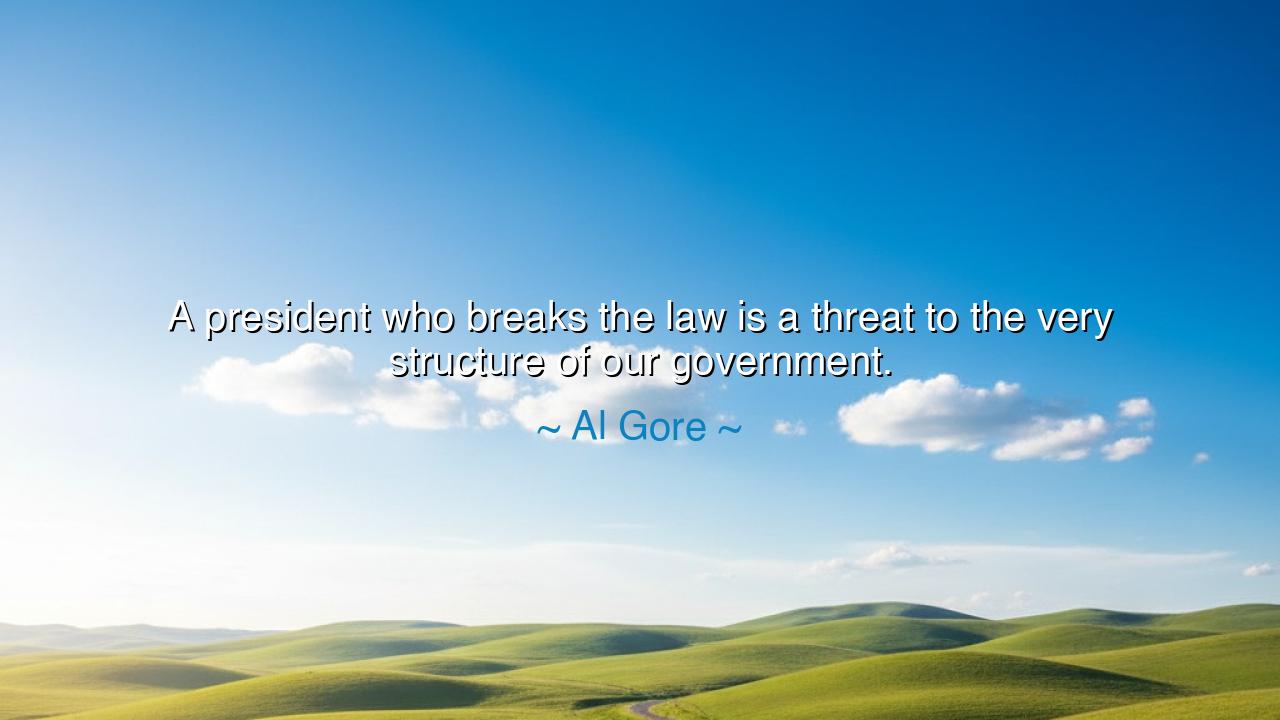
A president who breaks the law is a threat to the very structure






Hearken, children of justice and seekers of wisdom, and attend to the words of Al Gore, who spoke with unwavering solemnity: "A president who breaks the law is a threat to the very structure of our government." In this declaration lies a profound meditation on authority, accountability, and the sacred trust inherent in governance. Gore reminds us that leadership is not merely the wielding of power, but the guardianship of the laws and principles that bind society together; when those at the pinnacle of authority flout these laws, they imperil the very foundations of the state.
The origin of Gore’s insight rests in the study of both history and contemporary governance, where instances of executive overreach demonstrate that no office, however exalted, is above the law. The president embodies the will and legitimacy of the people, and the oath taken upon assuming office binds the leader to justice, duty, and the Constitution. To violate the law is to breach a sacred covenant, undermining not only trust, but the structural integrity of the institutions designed to maintain order and liberty.
Consider the imagery of structural threat. A nation, like a grand edifice, relies upon pillars of law, ethics, and civic duty. The president, as chief steward, bears responsibility for maintaining the strength and alignment of these pillars. If the steward himself undermines the laws, the edifice trembles; cracks appear not merely in policy, but in public confidence, institutional legitimacy, and the moral fiber that binds citizens to their government. Gore’s words illuminate the fragility of trust and the gravity of executive accountability.
History provides vivid exemplars. In the United States, the Watergate scandal of the 1970s revealed the peril of presidential misconduct. When President Nixon’s aides engaged in illegal activity, and the president attempted to obstruct justice, the integrity of the executive branch and public faith in government were gravely endangered. The crisis necessitated rigorous investigation, legal scrutiny, and ultimately led to resignation, preserving the constitutional order. This episode echoes Gore’s warning: when a president breaks the law, the very structure of governance is imperiled.
Gore’s reflection also illuminates the ethical dimension of leadership. Authority derives legitimacy from the law and the consent of the governed. When a president violates legal norms, it signals that those charged with enforcing the law may be powerless or complicit, eroding both compliance and respect among citizens. Governance without accountability is no longer stewardship but tyranny, and the moral authority of the office is shattered.
The lesson is timeless: the law must be sovereign, and leaders accountable. Citizens and leaders alike must recognize that the health of a nation depends upon adherence to legal and ethical standards at every level of authority. To preserve the integrity of government, the highest offices must model compliance, fairness, and restraint. Gore teaches that safeguarding liberty requires vigilance, courage, and a commitment to justice that transcends rank or influence.
Practical actions emerge naturally: support transparent governance and the rule of law; engage in civic education to understand constitutional responsibilities; hold leaders accountable through oversight, investigation, and civic participation; and cultivate a culture in which no person, however exalted, is above the law. By doing so, citizens reinforce the structural and moral foundations of government, ensuring that authority remains a force for justice rather than a source of peril.
In sum, Gore’s words illuminate a profound truth: the legitimacy and survival of government depend upon the lawfulness of its leaders. Let this wisdom guide rulers and citizens alike, instilling vigilance, integrity, and respect for the principles that sustain freedom and order. A nation endures not merely by its structures, but by the fidelity of those entrusted with their stewardship, and by the courage of its people to uphold the sacred covenant of law.
If you wish, I can craft an even more epic, mythic version, turning Gore’s reflection into a heroic narrative of law, accountability, and the moral foundations of leadership—perfect for immersive audio storytelling. Do you want me to do that?






AAdministratorAdministrator
Welcome, honored guests. Please leave a comment, we will respond soon